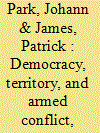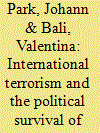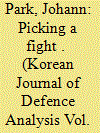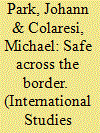|
|
|
Sort Order |
|
|
|
Items / Page
|
|
|
|
|
|
|
| Srl | Item |
| 1 |
ID:
137821


|
|
|
|
|
| Summary/Abstract |
Democracy and territory are two of the most important factors that affect conflict and war. Yet no research design looks directly at a possible interaction between these two variables to influence occurrence of armed conflict. This study seeks to answer the following question: “How do two democracies behave when a contentious issue such as territory arises as the source of conflict between them?” Results based on Militarized Interstate Dispute data from 1920 to 1996 produce the conclusion that the pacifying effect of democracy stands up for both territorial dyads and non-territorial ones in spite of the imperatives toward militarization created by territorial conflict. However, territory of high salience still appears to increase the likelihood of armed conflict between two democracies.
|
|
|
|
|
|
|
|
|
|
|
|
|
|
|
|
| 2 |
ID:
154737


|
|
|
|
|
| Summary/Abstract |
This study examines whether transnational terrorist attacks impact the political survival of leaders. We argue that external security threats, such as those from transnational terrorist incidents, can undermine incumbent target governments by exposing foreign policy failures and damaging society’s general well-being. Yet, terrorism may not destabilize democratic governments as a result of citizens rallying around their elected leaders in threatening times. Focusing on Archigos’ survival leadership data and International Terrorism: Attributes of Terrorist Events’ terrorism data for the 1968–2004 period, we find that autocrats who experience higher instances of transnational terrorist attacks are more likely to exit power. Democrats, however, are relatively secure to the destabilizing influence of transnational terrorism.
|
|
|
|
|
|
|
|
|
|
|
|
|
|
|
|
| 3 |
ID:
160727


|
|
|
|
|
| Summary/Abstract |
Are countries concerned about the impact on interstate commerce of security externalities? Trade often makes countries vulnerable to the vagaries of the international market and shifts the power relationship between partner countries. The volume of trade, however, has increased enormously over time. We examine how interstate rivalry affects interstate trade. An extensive literature examines the role of interstate security in shaping interstate commerce but pays little attention to that of rivalry. Similarly, the thriving rivalry literature has yet to explore the role of rivalry in non-security interstate relations such as trade. We aim to fill this gap. We argue that rivalry deters trade activities, and that this tendency is intensified amid deeper and more competitive rivalry. Using a global sample from 1949 to 2000, we find that rival dyads trade less than others, and that the negative impact of this on equal-power dyads is greater than that for unequal-power pairs.
|
|
|
|
|
|
|
|
|
|
|
|
|
|
|
|
| 4 |
ID:
154936


|
|
|
|
|
| Summary/Abstract |
Research shows that autocracies as well as democracies have reasons to avoid
strong enemies. What, then, make democracies distinctive from autocracies
in conflict selection? A critical difference may lie in the normative constraints
democracies experience. Focusing on the roles of public sentiment and liberalism,
we argue that democrats bearing high levels of accountability are less likely to
choose armed conflict without justifiable causes. We assess the roles of three liberal
factors in regard to the characteristics of target countries: respect of human rights,
democratic representation, and economic interdependence. Material factors, such
as relative military capability and geographic constraints are also considered.
The results show that both autocracies and democracies tend to attack easier
foes, but democracies avoid attacking countries that respect human rights and are
economically interdependent. Additionally, unlike autocracies, democracies do not
view other democracies as attractive targets of military attacks.
|
|
|
|
|
|
|
|
|
|
|
|
|
|
|
|
| 5 |
ID:
131003


|
|
|
|
|
| Publication |
2014.
|
| Summary/Abstract |
We investigate the research findings reported in Gibler (2007) that suggest the democratic peace is in fact a spurious artifact of stable borders. If corroborated, this set of findings would mark an important reorientation for the field. However, we show that the research design used in Gibler (2007) suffers from several problems, including omitting the lower order terms of interaction variables and inappropriately assuming cross-dyad independence of artificially created dyadic democracy scores. Our replication and extension shows that even when controlling for stable border variables, democracy continues to be a consistently useful predictor of international conflict. Further, the stable border variables themselves prove to be less consistent predictors of both peace and democracy as compared to previous research. These results suggest that both territorial issues and democracy can coexist as explanations for interstate bellicosity.
|
|
|
|
|
|
|
|
|
|
|
|
|
|
|
|
|
|
|
|
|